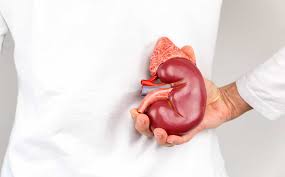Article
Finding Your Own Answers to Kidney Cancer
Author(s):
Dawne Gee worked hard to get answers about her kidney cancer.
In her community, Dawne Gee is known as the person with answers.
As a news anchor in Louisville, Kentucky, Gee, 56, is a smiling face to many on and off camera who often contact her with their concerns, especially when it comes to health because Gee has been so open about her own health struggles.
“I grow tumors,” Gee said. “That’s just what I do.”
But there was a period of about three years when no one gave her the answer she needed.
Gee has a recurrent, benign tumor condition, so when a technician spotted three small growths in her left kidney following MRIs for stomach pain several years ago, they were considered cysts and both she and her physician let them go.
But the health troubles persisted. Subsequent MRIs showed the “cysts” had grown. Despite her growing concern, doctors continually told Gee not to worry about the growths and concentrate on her stomach pain, blood pressure, or other issues.
Finally, after feeling increasingly sick and seeing blood in her urine, Gee asked for her medical records, took them to a different facility to see a different doctor, and got another scan. There, a physician called her and suggested she had kidney cancer.
“That floored me because I’d been asking about these tumors for three years,” she said.
Immediately, Gee was scheduled for a nephrectomy to remove her left kidney and was soon diagnosed with a type of slow-growing renal cell carcinoma. This was in 2014.
“[Getting my records and] beginning the process of getting my kidney removed saved my life and I’m glad someone listened.”
Gee calls hers a “cancer family” — about 25 people including both grandmothers, four aunts, and three cousins have had cancer – so she knows she’s at risk. She’s also done genetic testing, which revealed the presence of five genetic conditions that make tumor growth more likely. However, much of what the test reported can’t be properly interpreted yet.
Recovering from nephrectomy wasn’t easy and Gee continued to struggle with stomach problems. She also had a stroke followed by an embolism, which she said were worse than the cancer. Today, she still has several tumors being watched.
Gee knows some of her health experiences, especially those that are the result of a genetic predisposition, might extend to others in her family and has urged them to do genetic testing. This includes her 35-year-old daughter, who has already had one tumor removed, though, despite her family history, she’s not eligible for genetic testing through insurance.
“In this battle of bad health, I learned that I we must be advocates of our own health. If a physician tells you something and you’re not comfortable, it’s ok to get a second opinion. Not only is it ok, it’s important to move to another doctor,” Gee said. “They kept telling me it was ok and I knew something wasn’t ok because I was really sick. And I only learned that after the fact and when I began to urinate blood.”
One way that Gee is proactive about advocating for her health is through a book where she keeps all her records and notes about how she’s feeling. The book helps her to know what is “normal” for her. Her doctors benefit too.
“They appreciate it greatly. They ask me questions first before they call my other doctors. If something doesn’t seem right, I can tell them the last time or over a month how I’ve felt. Then everyone’s on the same page.”
She also makes sure to take someone with her to each appointment.
“When you hear cancer, you don’t hear a lot after that,” Gee said. “You need someone there who can listen when you can’t, who can ask questions you can’t at the present time, and who will be there to make sure everything is ok.”
After her nephrectomy, Gee returned to work perhaps too quickly, and perhaps worked too much, she said, but it’s her passion. More so now that she knows intimately what it’s like to need an answer or need help.
“I’ll take any call and if someone needs an answer, I say, ‘hold on, I’ll find out’,” Gee said. “I always tell my health story — it’s hard but you can keep going. If people see you go through kidney cancer and then see you out still making it, it’s kind of medicine for someone else.”




